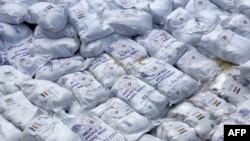The U.N. children’s fund is appealing for $25 million to provide humanitarian aid to 1.7 million children in Sri Lanka, many of whom are at risk of dying from malnutrition-related causes.
Sri Lanka is facing its worst economic crisis since it gained its independence in 1948. The United Nations estimates nearly 5.7 million people, half of them children, need humanitarian aid.
UNICEF says nearly one in two children in Sri Lanka requires some form of emergency assistance, including nutrition, health care, clean drinking water, education and mental health services.
Speaking from the capital, Colombo, UNICEF representative in Sri Lanka Christian Skoog says malnutrition seriously threatens to the lives and well-being of children.
Chronic wasting
He says Sri Lanka has the second-highest rate of acute malnutrition among children under 5 in South Asia and at least 17 percent of children are suffering from chronic wasting, a disease that carries the highest risk of death. He says UNICEF is in a race against time to make sure children most at risk receive the help they need.
“The target is to treat 56,000 children for severe acute malnutrition up to six to seven months in our UNICEF plan," Skoog said. "Potentially they could all be at risk of dying. There is some support. So, with that we should be able to come in and avoid those deaths.”
UNICEF reports the education of 4.8 million children hangs in the balance. It says boys and girls are likely to drop out of school because many school feeding programs have stopped. It says 25 essential medicines for children and pregnant women used in the treatment of life-threatening diseases are expected to run out in the next two months.
Skoog says the current crisis also is creating serious protection concerns for children.
“There already are 10,000 children in institutional care in Sri Lanka, mainly as a result of poverty," he said. "Such institutions are not a good place for children to grow up in. And now, unfortunately, conditions are worsening, and yet more families are taking their children to these institutions because they simply cannot afford to feed them.”
As part of its humanitarian plan, UNICEF will ensure 100,000 young children receive school meals, often the only source of nutritious food for impoverished children. Money from the appeal also will provide primary health care for 1.2 million people, safe drinking water for 1.5 million people and other lifesaving assistance.




